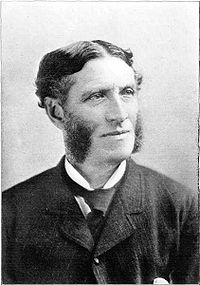
In the fields of philosophy and of aesthetics, the term philistinism describes the attitudes, habits, and characteristics of a person who deprecates art, beauty, spirituality, and intellect.[1] As a derogatory term, philistine describes a person who is narrow-minded and hostile to the life of the mind, whose materialistic and wealth-oriented worldview and tastes indicate an indifference to cultural and aesthetic values.[2]
The contemporary meaning of philistine derives from Matthew Arnold's adaptation to English of the German word Philister, as applied by university students in their antagonistic relations with the townspeople of Jena, early modern Germany, where a riot resulted in several deaths in 1689. Preaching about the riot, Georg Heinrich Götze, the ecclesiastical superintendent, applied the word Philister in his sermon analysing the social class hostilities between students and townspeople.[3][4] Götze addressed the town-vs-gown matter with an admonishing sermon, "The Philistines Be Upon Thee", drawn from the Book of Judges (Chapt. 16, Samson vs the Philistines), of the Old Testament.[5][6]
- ^ Webster's New Twentieth Century Dictionary of the English Language – Unabridged (1951) p. 1260
- ^ College Edition: Webster's New World Dictionary of the American Language (1962) p. 1099
- ^ Christian August Vulpius (1818). Curiositäten der physisch- literarisch- artistisch- historischen Vor- und Mitwelt: zur angenehmen Unterhaltung für gebildete Leser. Im Verlage des Landes-Industrie-Comptoirs. p. 188.
In Jena, vor dem Lobedaer Thore, befindet sich ein Gasthof, genannt zum gelben Engel. Hier gab es im L.1693. Händel, und ein Student wurde in denselben so geschlagen, daß er todt auf dem Plaze blieb. Den Sonntag darauf, predigte der Superintendent Götz heftig gegen diese That, und sagte: Es sey bei diesem Mordhandel hergegangen, wie dort stehe geschrieben: Philister über dir, Simson! Was geschieht? Kaum wurde es Abend, als es auf allen Gassen ertönte: Philister-über dir, Simson! Von dieser Stunde an, hießen die Jenaischen Bürger, Philister. Die Studenten brachten diese Benennung mit auf andere Akademien und endlich kam sie so ziemlich, in's ganze bürgerli che Leben. Die nicht Studenten waren, sollten Philister seyn. Das amusrte. In Jena, war damals das Balgen an der Tagesordnung.
- ^ Friedrich Kluge (4 June 2012). Deutsche Studentensprache. Walter de Gruyter. pp. 57–. ISBN 978-3-11-148858-5.
- ^ Benét's Reader's Encyclopedia Third Edition (1987) p. 759
- ^ Notes and Queries. Oxford University Press. 1872. pp. 393–.